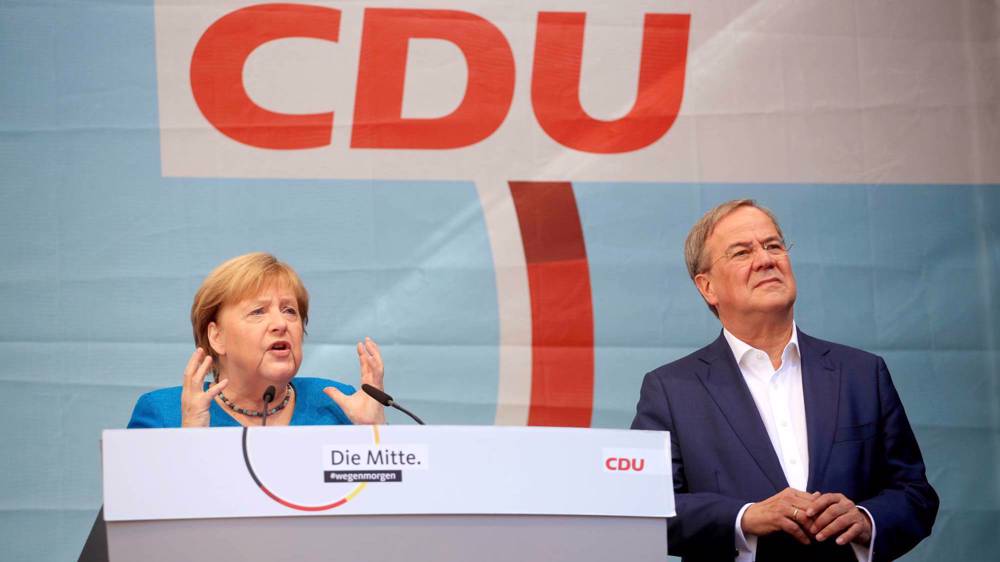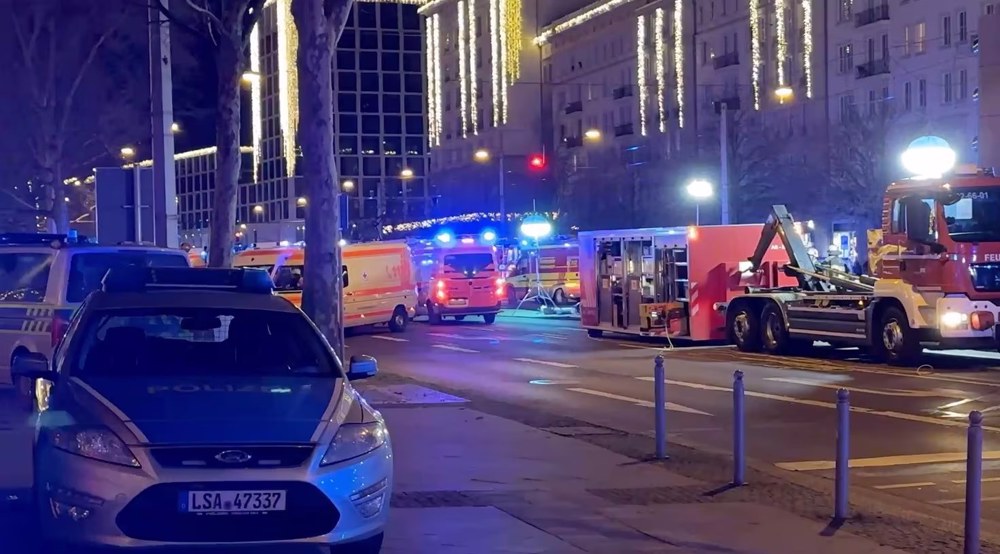Preliminary poll results show SPD takes narrow lead in post-Merkel election
Germany’s center-left Social Democrats took a razor-thin lead on Chancellor Angela Merkel’s conservatives in Sunday’s vote to decide her successor, preliminary results showed, sparking immediate claims from both sides to form the country's next government.
Preliminary results published on public television showed Finance Minister Olaf Scholz’s SPD with around 24.9 to 25.6 percent of the vote, followed closely behind by Merkel's Christian Democrats and their candidate Armin Laschet on 24.4 to 24.7 percent.
With the race in dead-heat in what is one of the most unpredictable elections for Europe’s biggest economy in decades, the SPD swiftly staked its claim with general secretary Lars Klingbeil saying his party “clearly has the mandate to govern.”
“It’s going to be a long election night, that’s for sure,” Scholz said. “But this is certain: that many citizens have put their crosses next to the SPD because they want there to be a change in government and also because they want the next chancellor to be called Olaf Scholz.”
With the conservatives staring down the barrel of their worst result since World War II, CDU secretary Paul Ziemiak admitted that the “losses are bitter compared to the last election” in 2017, when the CDU-CSU notched up 33 percent.
But Laschet, 60, warned that the jury was still out on which party triumphed, as he said that he would “do everything we can to build a government led by the (conservative) Union.”
Sunday’s epochal election ushers in the end of 16 years in power for Merkel, and also thrusts Germany, a byword for stability, into a new period of political uncertainty.
With the CDU-CSU and the SPD each seeking to form governing coalitions in a race for power, Germany was up for a rocky few months that could blunt it on the international stage for some time.
Blunders
The SPD, Germany’s oldest party, was polling so badly just a few months back that many had written off the possibility that it may even be in the next government.
But Scholz, 63, a colorless but competent former mayor of Hamburg, now stands a chance of becoming the first SPD chancellor since Gerhard Schroeder, who lost to Merkel in a close contest in 2005.
The conservatives meanwhile could be headed for their worst post-war score even though their candidate Laschet went into the race in the summer as the clear favorite to grab the top job in Europe's biggest economy.
His popularity began to wane after a series of blunders over the summer, including being caught on camera laughing in the background during a tribute to the victims of devastating floods in Germany.
In the meantime, Scholz, who at the start of the year had looked down and out in the race, saw his ratings begin to rise as he avoided making such embarrassing mistakes.
With polls predicting a devastating defeat for Laschet, the conservatives trotted out their biggest asset – Merkel.
Although she had originally planned to keep a low profile in the campaign, she found herself dragged into Laschet’s frantic tour across the country to canvass for last votes – something that has helped the CDU-CSU to stem a drop in popularity in the last days of the campaign.
Green role
Although climate change had been one of the top concerns among voters in the run-up to the vote, it has not translated into a sweep for the ecologist Greens.
The Green party enjoyed a surge in support earlier this year after naming 40-year-old Annalena Baerbock as its chancellor candidate, at one point even briefly taking the lead as the most popular party.
But after a series of missteps by Baerbock, including a plagiarism scandal, the Greens fell well behind the two leading parties, the early results showing them just under 15 percent of the vote.
While the chancellery may be out of reach for the Greens, the party will likely have a junior role in Germany's next government.
On the eve of the polls, Scholz voiced his preference for a partnership with the Greens, calling on voters to give him the score needed to go with a two-way coalition.
If the early results are confirmed, Scholz will, however, need one more party, with the liberal FDP his most likely choice.
However, with the FDP a natural bedfellow with the conservatives rather than the center-left, it could play an outsized role in determining which coalition would stand.
(Source: AFP)
US fighter aircraft shot down ‘in friendly fire’ amid aggression on Yemen
Yemeni FM: Israel’s sponsors accountable for ongoing aggression on Sana’a
Eight Palestinians killed as Israel attacks Gaza school, hospitals
VIDEO | Rome, Milan host new protests in solidarity with Palestinians
Dec. 21: ‘Axis of Resistance’ operations against Israeli occupation
Spain jurists demand ties with Israel ties be cut
VIDEO | Press TV's news headlines
VIDEO | Iran honors top Science Olympiad medalists










 This makes it easy to access the Press TV website
This makes it easy to access the Press TV website